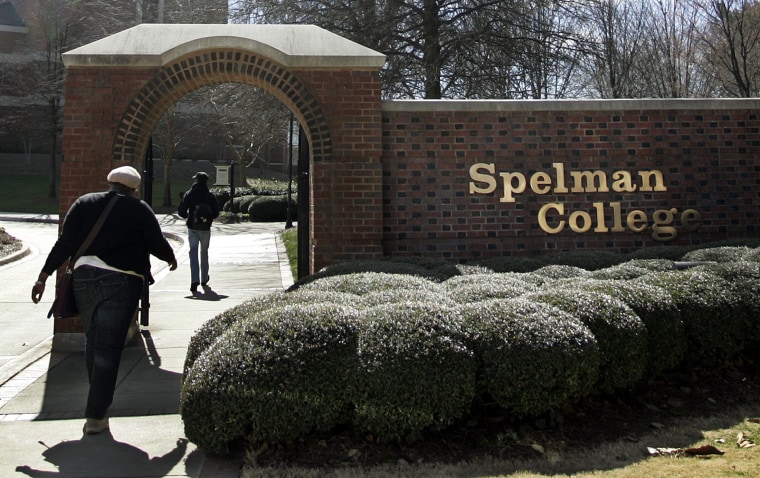Spelman College’s newly minted LGBTQ scholarship program and lecture series may lay the foundation for greater inclusion for lesbian, gay, bisexual, transgender and queer students at historically black colleges and universities (HBCUs) across the country.
At least that is the hope of Beverly Guy-Sheftall, founding director of the Women’s Research and Resource Center at Spelman and the Anna Julia Cooper Professor of Women’s Studies.
“HBCUs have been less visible and outspoken about LGBTQ issues, though they [have] had a long history around other social justice issues, especially around race, racial justice, and civil rights,” Guy-Sheftall, who established the new scholarship program, told NBC News. “Since HBCUs are increasingly crafting women's studies programs in which gender and sexuality are central ... this program will call attention to these new initiatives on HBCU campuses.”

The Dr. Levi Watkins Jr. Scholars Program will award two renewable scholarships for LGBTQ advocates at the all women's college and will also have a companion lecture series that will explore contemporary issues of race, gender and sexuality.
Dr. Watkins, the late cousin of Professor Guy-Sheftall, was a civil rights activist, heart surgeon and longtime advisory board member of the Women's Research and Resource Center. The scholarship program that bears his name will begin in 2018.
While recipients of the scholarship do not have to personally identify as LGBTQ, they do have to be committed to LGBTQ advocacy.
“Just occupying the category without an interest in LGBTQ issues would not be sufficient in the process,” Guy-Sheftall said. “We are aware that just because one occupies a marginalized category does not necessarily mean that person is interested in or committed to issues connected to one's identity category.”
Related: 15 Recently Released LGBTQ Books for Your Summer Reading List
Earl Fowlkes, president and CEO of the Center for Black Equity, an LGBTQ advocacy organization, applauded the new program.
“By acknowledging the presence of LGBT students on campus, Spelman has taken a step toward making their campus a space for all students," he said. "This is very important and very significant step in dealing with homophobia on our college campuses."
“It is important that HBCUs catch up with the times and start understanding that their campuses have not been traditional spaces for LGBT students," Fowlkes added. "Most HBCUs are conservative, and its taken them a while for them to understand that LGBT rights are indeed human rights and must be protected on and off campus.”
Leslie Hall, who heads the HBCU Project at the Human Rights Campaign Foundation, agrees. He said the issues faced by LGBTQ students in higher education are both structural and cultural.
“For Spelman College to embrace such an initiative is huge in the HBCU landscape,” Hall said. “It means that Spelman recognizes the unique challenges faced by LGBTQ students as they matriculate through college.”
LGBTQ middle school and high school students are less likely than their non-LGBTQ peers to say they plan to pursue secondary education, according to Rebecca Mui, education manager at the Gay, Lesbian and Straight Education Network (GLSEN).
“LGBTQ students who face higher incidences of bullying and harassment are less likely to feel supported and connected to their school communities, which has significant implications for their own educational and vocational outcomes,” Mui explained. “This is why it’s so important for colleges and universities to be explicitly welcoming of LGBTQ students, to ensure that they feel that they belong and would be supported.”
Isaiah Wilson, the director of external affairs for the National Black Justice Coalition (NBJC), said Spelman’s announcement makes him proud to be an HBCU alumnus.
“It is incredible to think that we are now at the point where we can have these conversations that were so stigmatized during my tenure at Morehouse College,” Wilson said. “HBCUs should be leading on issues of race, gender and sexuality. This is a great step forward ... This is a huge opportunity for black people to see the diversity of blackness.”
Spelman is not the first HBCU to create a scholarship fund for LGBTQ students. Texas Southern University created one earlier this year, and Howard University created the Lavender Fund in 2015.
“Most certainly, other schools will follow suit," Hall predicted.
